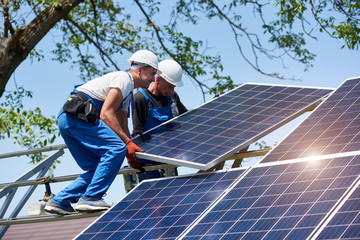Installing solar panels is a green initiative with real environmental benefits. Customers and employees will appreciate that you care about the environment.
Ensure that your team is knowledgeable about the product. You want them to be able to answer questions and address concerns about the solar energy system. Reach out The Amp Solar Company for comprehensive assistance.
Provide consulting services to help clients assess their energy needs and design custom solar solutions. This can be a high-value service that increases customer loyalty and brand recognition.
As solar energy has grown over the past decade, so has the number of companies serving consumers. Sadly, the industry has also become rife with scams and unscrupulous practices. Federal and state agencies, like the Consumer Financial Protection Bureau (CFPB) and the Federal Trade Commission (FTC), work to spread awareness about these issues and encourage consumers to report deceptive sales tactics.
One way to determine if a company is legitimate is to ask for references from current customers. You may also want to find out if the company has an online customer satisfaction survey. These will help you make an informed decision about which solar company to choose.
When shopping for a solar system, you should look at the total cost of ownership, including upfront payments, installation fees, and financing costs. The best way to do this is to request a quote from multiple companies. Then, compare the total price of each system to its estimated savings. A good solar company will include this information in their quotes, so you can see how much it will save you each year and when you’ll break even on your investment.
Depending on where you live, the average household can save up to $50,000 over a solar panel’s 25-year lifespan. However, your savings will depend on the type of solar panel system you purchase and whether you own it, lease it or finance it. You’ll typically find the largest savings with a cash purchase, followed by a loan and then a PPA or power-purchase agreement (PPA).
Another factor to consider is what happens if you move. Some solar companies allow you to transfer your contract with them to a new homeowner or business owner, while others require the remaining balance on your contract to be paid off in full upon moving. It’s important to weigh these factors before making a final decision.
If you’re looking to invest in a solar system, ask for a power-production guarantee. This will ensure that your solar panels are generating the amount of electricity promised in your contract. This is especially important if you’re considering a lease or PPA.
Reduce Carbon Footprint
Many people are concerned about climate change and how it is impacting the environment. One way to help reduce our carbon footprint is by switching to solar energy. Solar energy uses clean, renewable, and free energy to produce electricity. It also helps to reduce utility bills and lowers carbon emissions. There are a number of ways that solar power can reduce your carbon footprint, including using solar panels to generate energy and by switching to hybrid or electric vehicles.
Starting a solar company requires research, investment, and time. It’s essential to understand the market and industry trends to make sound business decisions. Profit margins in the solar industry are often razor thin, and sustaining profits requires staying on top of industry developments and maximizing operational efficiency.
Solar businesses that focus on value and quality rather than simply being the least expensive alternative are better equipped to weather competitive pressures and stay in business for the long haul. In addition to focusing on product and service differentiation, solar companies should focus on building strong relationships with customers to ensure repeat business and referrals. Having an excellent customer support team is vital. This includes knowledgeable staff that can answer questions and address concerns quickly. In addition, the customer service team should have a thorough understanding of solar system design and operation.
Unlike fossil fuels, which can release harmful toxins into the environment, solar panel technology emits no harmful chemicals during production and operations. They require very few raw materials, and their life expectancy is 25 years or more. This makes them a very environmentally responsible choice for home and commercial use.
The manufacturing process of solar panels is also low in carbon emissions. The raw materials needed are rare and are found in limited supply. The specialized minerals used to make silicon cells are extracted from the ground. These minerals are then processed to create the solar cell. However, the entire manufacturing process emits very little CO2. Once in operation, solar panels emit no carbon dioxide, and maintenance is minimal. This results in a very low carbon footprint compared to other traditional energy sources.
Reduce Utilities Costs
Using solar energy to power homes can save money in many ways. It can lower utility bills, reduce or eliminate reliance on fossil fuels, and increase property values. Solar companies can also help customers take advantage of rebates and incentives. They can also provide advice and guidance on the best solar energy systems to buy and install.
In addition to reducing upfront costs, solar systems help homeowners lock in their energy prices for the life of the system. This can be particularly beneficial in areas with volatile or consistently increasing electricity rates. Some companies also offer battery storage options to further stabilize household energy costs.
Homeowners can further lower their energy costs by installing ENERGY STAR appliances and equipment, replacing old windows and doors with more efficient ones, and using a smart thermostat to manage energy use. They can also increase their savings by taking advantage of net metering or demand response programs. These are often offered by local utilities and entail signing up for a rate plan that includes peak usage hours, when electricity is most expensive. By supplying power during these times with their solar panels, homeowners can significantly lower their electric bill.
When purchasing a solar system, homeowners can choose to finance the upfront costs through a loan or purchase it outright. The former involves monthly payments, while the latter does away with loan expenses for substantial immediate and long-term savings. Solar companies can help homeowners determine which option is better for them by calculating their electric bills and comparing them with the projected savings of their new solar system.
Solar businesses can also cut soft costs by streamlining the solar adoption process. This can involve reducing the amount of paperwork and red tape, improving sales leads, and minimizing training costs. They can also work with governing bodies to provide technical assistance programs for solar adoption.
It is important for solar companies to have the right team to make a successful transition to renewable energy. Ideally, the entire team should be NABCEP certified. It is also vital that they know all aspects of the solar industry, from design and engineering to installation and customer service. They should also be familiar with local codes and regulations.
Increase Property Value
Increasing numbers of homeowners are adding solar panels to their properties, and when the time comes to sell, these systems often increase the home’s value. One reason is that a solar system can significantly reduce electricity bills. When buyers walk into a house and see that the electricity costs are substantially lower than those in neighboring homes, they will be enticed to make an offer for the property.
Some studies suggest that solar increases property values by about $15 per watt. Nevertheless, a home’s ability to attract offers depends on the size and location of the solar system, as well as local energy prices. For example, a study conducted by Lawrence Berkeley National Lab found that homes within half a mile of large-scale solar installations experience a price reduction, while those with smaller systems see a substantial increase in home values.
A big difference is the ownership of the solar system. Leases and PPAs are generally less attractive to potential buyers, especially if they involve ongoing payments. They also typically include inflation escalators that can dramatically increase a homeowner’s electricity rates over the life of the contract. This is why it makes more sense for home owners to buy and own their solar systems.
If you are considering going solar, or if you have already installed a system and want to know how it will affect your home’s saleability, talk with a professional. They will be able to provide you with detailed information about the benefits, costs and obligations of owning your system. They can also answer questions about how to transfer ownership of the system to a new buyer.
Depending on the type of solar system you have, you may need to notify your solar company before selling your home. Some companies require notice when a system is being transferred to another owner, while others may charge a transfer fee. Additionally, if you have a loan or lease, you will need to contact your mortgage company to ensure that the new homebuyer can assume your obligation to pay off the solar loan or continue making payments through a PPA.

